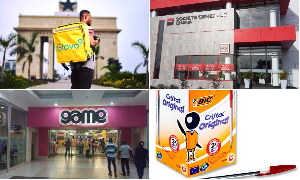- Home - News
- TWI News | TV
- Polls
- Year In Review
- News Archive
- Crime & Punishment
- Politics
- Regional
- Editorial
- Health
- Ghanaians Abroad
- Tabloid
- Africa
- Religion
- Election 2020
- Coronavirus
- News Videos | TV
- Photo Archives
- News Headlines
- Press Release
General News of Thursday, 3 March 2011
Source: GNA
Ten-year anti corruption plan rolled out
Cape Coast, March 3, GNA - A 24-member Working
Group comprising representatives of government, parliament,
private sector, civil society and judicial service has rolled out a
10- year action plan to implement strategies to reduce
corruption in the country. Consequently, a one-day stakeholders' consultation and
workshop to collate views and suggestions was held at Elmina
to help establish and coordinate a systematic approach of
developing a National Anti Corruption Plan (NACAP) which
would help enforce laws to ensure financial accountability and
eliminate loopholes in the country's legal act. It was facilitated by the Commission For Human Rights and
Administrative Justice (CHRAJ). Speaking at the Workshop Mr. Joseph Whittal, the Director
of Legal Investigations of CHRAJ, said although corruption all
over the world was a threat to the moral, political, economic
and social wellbeing of people, efforts to fight it over the years
had failed because it did not effectively delve into the root
causes of corruption. He mentioned some of the problems of corruption as
economic, political, social and cultural factors as well as the
weak enforcement of laws and regulations, weak institutions
and lack of political commitment or will to fight corruption. According to him, a research by Transparency
International (TI) showed that 31% of Ghanaians considered
political parties very corrupt and cited the recent payment of
exorbitant filing fees by political aspirants as a factor in
deepening the country's political woes and destroying the hope
to see an end to political corruption. It revealed that there had been 63% instances where
security agencies had demanded bribes before providing
services and another 32% instance where bribes had been paid
for acquisition of permits and license. He accused the private sector for contributing and
facilitating corruption in the country adding that a report by a
World Bank Survey showed that 39% of private firms make
informal payments to public officials while 61% give gifts to
secure government contracts. He said a recent survey by Ghana Integrity International
(GII) showed that Ghanaians had low rating for state agencies
like the security, revenue collection, Metropolitan, Municipal
and District Assemblies (MMDAs) in terms of honesty and
integrity and a whooping 90% of urban dwellers considered
corruption as a serious problem. The Central Regional Minister, Mrs. Ama Benyiwa Doe in
a brief speech read on her behalf, said the quest for good and
effective governance would be a reality if individuals uphold
anti-corruption actions by enforcing transparency in all
institutions.










